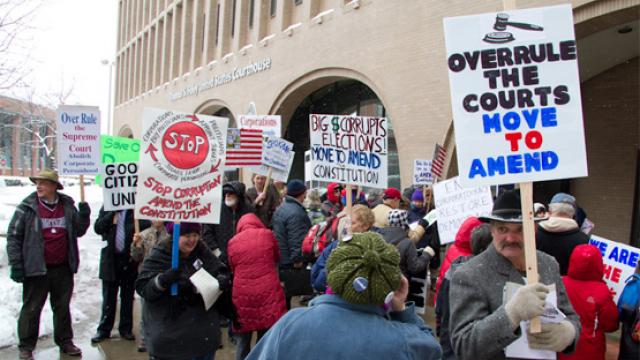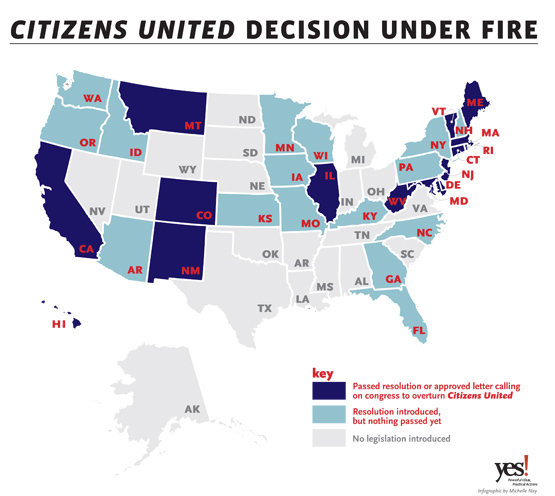
Delaware became the 15th state last week calling on the U.S. House of Representatives to overturn the Citizens United Supreme Court decision, which allows unlimited spending on elections by corporations, unions, and other groups. The case also represents an expansion of prior rulings that have reasoned that corporations are people and that corporate election spending qualifies as protected speech under the First Amendment.
An increasing number of legislators, activists, and ordinary Americans believe the decision is so harmful that they’re building a movement at the state and local levels to pressure Congress to take action on the issue.
In Delaware’s case, eleven state senators and 24 state representatives signed a letter about the ruling, which was sent to both of Delaware’s senators as well as to U.S. Rep. John Carney (D–Del.)
“The United States of America’s elections should not be permitted to go to the highest bidder,” the letter reads, “and yet this is the risk that rises from the ashes of the Citizens United decision.”
The 15 states that have issued resolutions or letters constitute nearly 80 million people, or just over a quarter of the U.S. population. Meanwhile, another 16 states have introduced similar legislation, but haven’t passed it yet. Resolutions asking for the repeal of Citizens United have also been passed by about 500 municipalities, according to the Nation.
Kaitlin Sopoci-Belknap is national director at the Move to Amend Coalition, which supports a constitutional amendment to strip corporations of their personhood rights. In a country where eight out of 10 people disagree with the Citizens United ruling, according to a poll by ABC News and the Washington Post, she says that resolutions and letters like Delaware’s are a sign that elected officials at the state level are listening to their constituents.
She remains skeptical that Congress will respond with action, but believes that pressure from the state and local levels may become so strong that Congress will be forced to act. Failing that, there’s another possibility: if two-thirds of the states in the U.S. call for a constitutional convention, they can go forward without Congress. Sopoci-Belknap says that simply raising the that possibility helps to ramp up pressure on the House.
“Congress doesn’t want to have a precedent of the states going around them,” she said.
Jonah Minkoff-Zern of the nonprofit Public Citizen argues that state-level resolutions are useful in themselves because they show members of Congress who want to overturn Citizens United that their constituents are behind them. He also points to the more than 125 active members of the House and Senate who have already called for a constitutional amendment, as well as President Barack Obama.
“If we’re down the road and we have 38 states that have called for an amendment and Congress still fails to act,” Minkoff-Zern says, then it might be time to consider possibilities such as constitutional conventions. “But we’re still a long way from there.”
Sopoci-Belknap says the Citizens United case has done a lot to raise awareness about corporate domination of American politics, but cautions against focusing exclusively on the ruling.
“Ultimately the amendment that passes needs to do more than overturn Citizens United,” she says. It needs to “make clear that corporations are not people and money is not speech.”
Some of the resolutions passed at the state level—such as Vermont’s and Illinois’s—have asked for wording that would do just that.
Watch for growing momentum around this issue in the coming months, as state lawmakers and groups like Move to Amend and Public Citizen work to turn up the heat on Congress.
3 WAYS TO SHOW YOUR SUPPORT
- Log in to post comments












